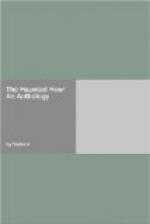“’And I’ll chain the blood-hound,
and the warder shall not sound,
And rushes shall be strew’d
on the stair:
So by the black-rood stone, and by holy St. John,
I conjure thee, my love, to
be there!’
“’Though the blood-hound be mute and the
rush beneath my foot,
And the warder his bugle should
not blow,
Yet there sleepeth a priest in a chamber to the east,
And my foot-step he would
know.’—
“’O fear not the priest, who sleepeth
to the east,
For to Dryburgh the way he
has ta’en,
And there to say mass, till three days do pass,
For the soul of a knight that
is slayne.’
“He turn’d him around and grimly he frown’d;
Then he laugh’d right
scornfully—
’He who says the mass-rite for the soul of that
knight,
May as well say mass for me!
“’At the lone midnight hour, when bad
spirits have power,
In thy chamber will I be’—
With that he was gone and my lady left alone,
And no more did I see.”
Then changed, I trow, was that bold Baron’s
brow,
From the dark to the blood-red
high;
“Now tell me the mien of the knight thou hast
seen,
For, by Mary, he shall die!”—
“His arms shone full bright, in the beacon’s
red light,
His plume, it was scarlet
and blue,
On his shield was a hound, in a silver leash bound,
And his crest was a branch
of the yew.”
“Thou liest, thou liest, thou little foot-page,
Loud dost thou lie to me!
For that knight is cold and laid in the mould,
All under the Eildon-tree.”—
“Yet hear but my word, my noble lord!
For I heard her name his name;
And that lady bright she called the knight
Sir Richard of Coldinghame!”
The bold Baron’s brow then changed, I trow,
From the high blood-red to
pale—
“The grave is deep and dark—and the
corpse is stiff and stark—
So I may not trust thy tale.
“Where fair Tweed flows round holy Melrose,
And Eildon slopes to the plain.
Full three nights ago, by some secret foe,
That gay gallant was slain.
“The varying light deceived thy sight,
And the wild winds drown’d
the name;
For the Dryburgh bells ring, and the white monks do
sing,
For Sir Richard of Coldinghame!”
He pass’d the court-gate, and he oped the tower-gate,
And he mounted the narrow
stair,
To the bartizan-seat, where, with maids that on her
wait,
He found his lady fair.
That lady sat in mournful mood;
Look’d o’er hill
and vale;
Over Tweed’s fair flood, and Mertoun’s
wood,
And all down Teviotdale.
“Now hail, now hail, thou lady bright!”—
“Now hail, thou Baron,
true!
What news, what news from Ancram fight?
What news from the bold Buccleuch?”
“The Ancram moor is red with gore,
For many a Southron fell;
And Buccleuch has charged us, evermore,
To watch our beacons well.”—




